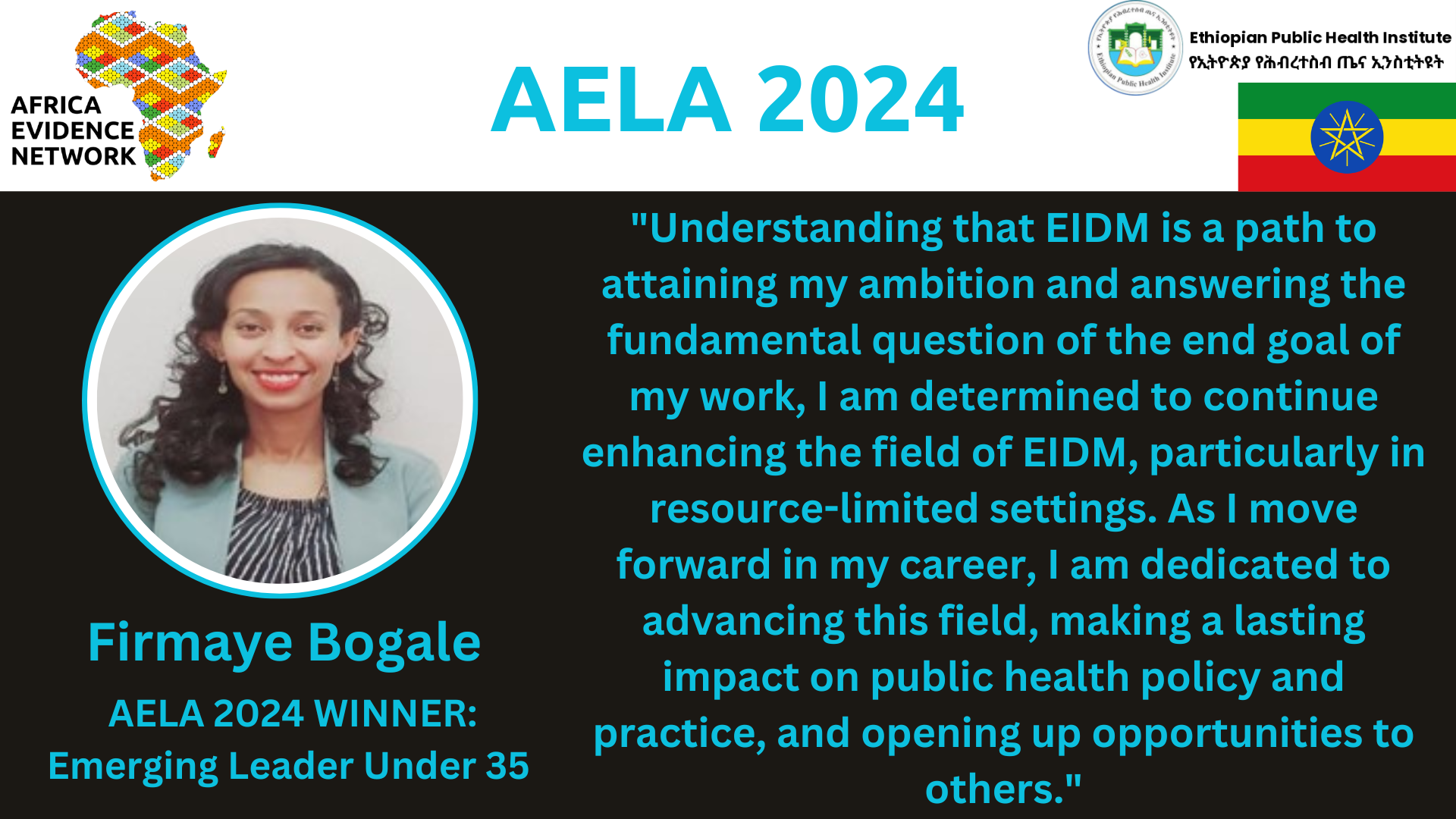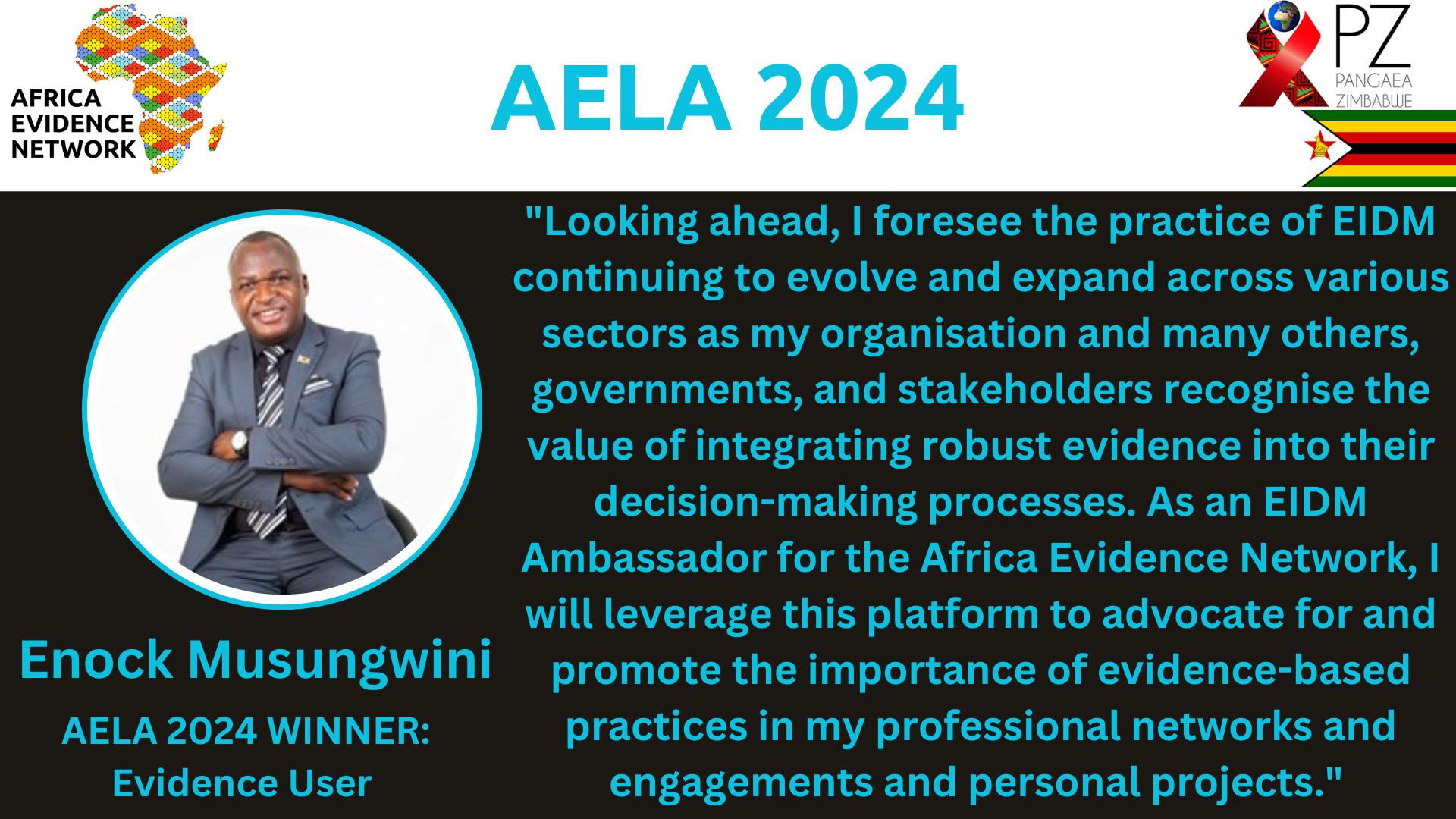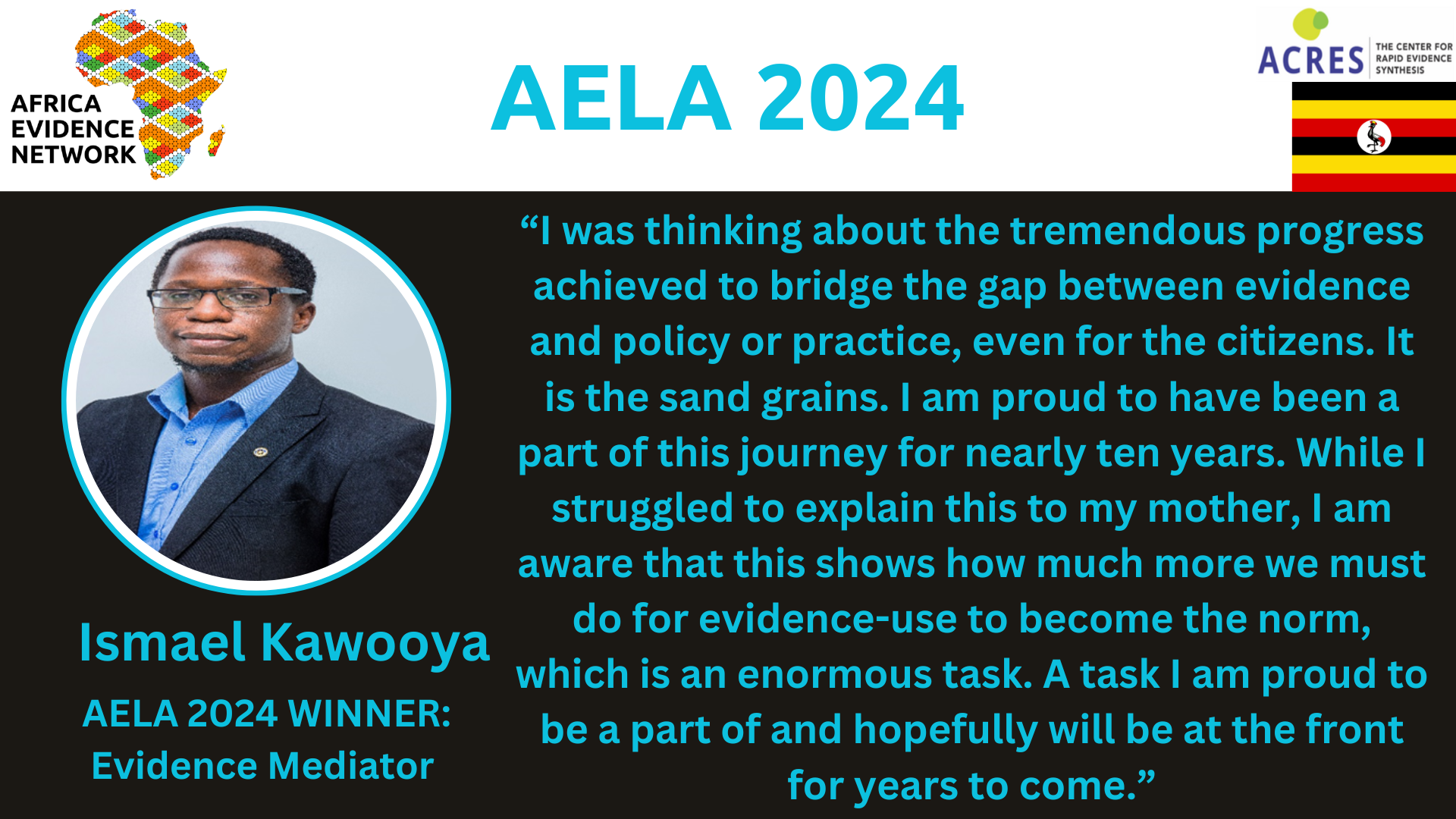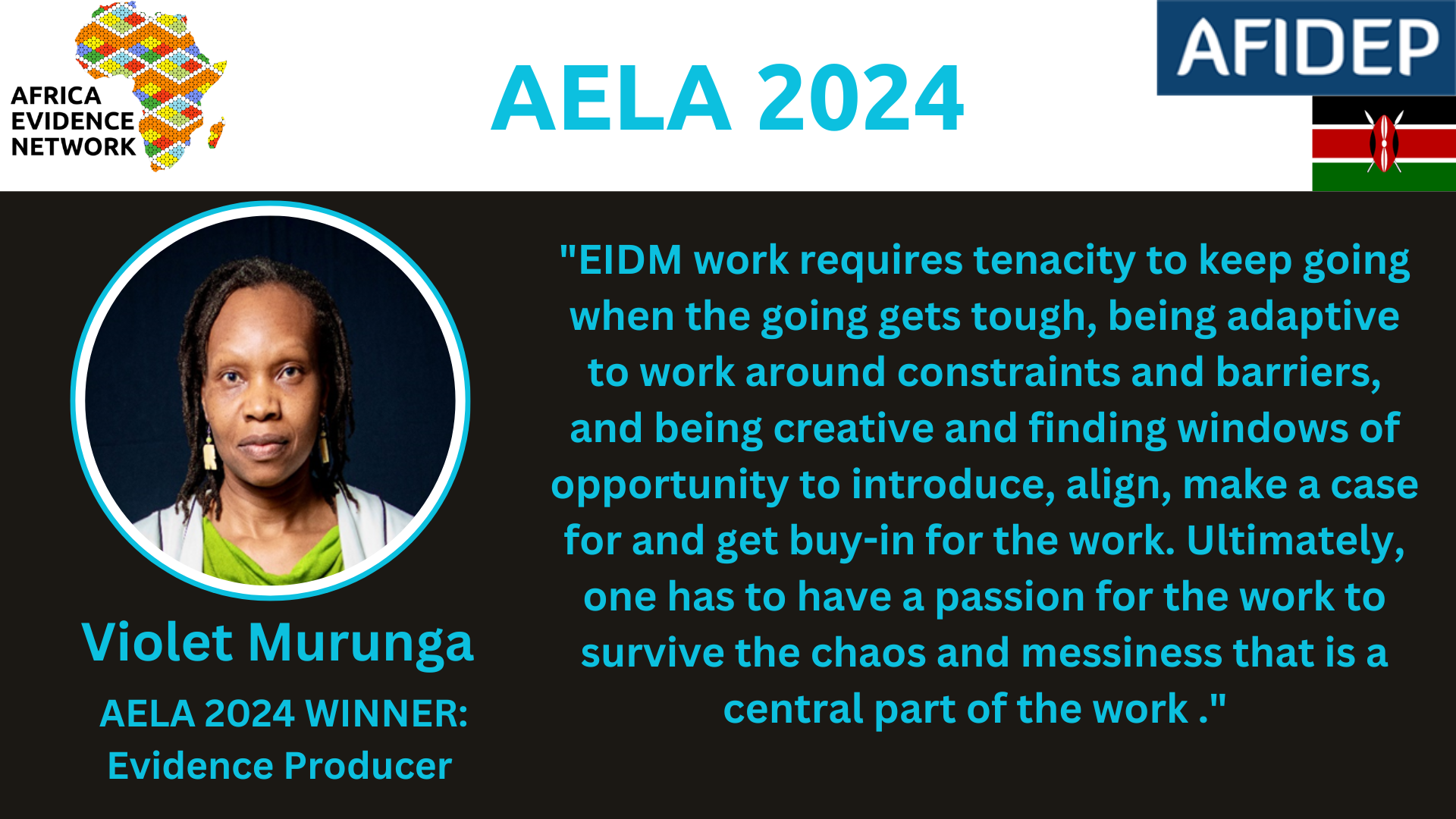
Firmaye Bogale is the inaugural winner of the Emerging Leader Under 35 category of the Africa Evidence Leadership Award 2024 offered by the Africa Evidence Network. We asked Firmaye to reflect on her work.
My professional journey in public health spans over a decade, encompassing both clinical and non-clinical healthcare environments. Early in my career, I had a keen interest in addressing the broader aspects of public health, but it took me some time to identify the right path. It was not until I began working on evidence-informed decision-making (EIDM) that I found the right path towards my ambition of reaching as many people as possible through public health.
My introduction to EIDM was serendipitous, yet my dedication to this field has been one of the most intentional decisions of my career. About five years ago, I joined the Ethiopian Public Health Institute as a junior researcher, hoping to get closer to research. Little did I know that this would be the start of an exciting journey into EIDM and knowledge translation, fields that require constant dedication and consistency.
EIDM and its challenges
Through my experience and the extensive literature on EIDM, an area that aims to ensure that policy decisions are informed by the best available evidence, I have seen that EIDM is essential for utilizing scarce resources more efficiently, reducing research waste, and improving transparency and accountability.
My experience in EIDM has entailed working on three main things. The first is working on research and evidence synthesis in the capacity of a researcher, the second is working on knowledge translation in the capacity of a knowledge intermediary/broker, and the third is working as an advocate for EIDM. Being involved in research has allowed me to work on quantitative and qualitative research and to synthesize evidence in different formats. Working on different formats of evidence synthesis has added a much-needed edge to my knowledge of research. My work on knowledge translation as an intermediary has developed my competencies to synthesize, summarize, and share evidence. My involvement as an advocate for EIDM included being part of a small community in the health sector of my country whose primary goal is promoting EIDM.
Along with this, I have observed both the ongoing progress and the significant challenges within the field. While there has been clear and continuous growth, there are also notable gaps in the application of evidence at different levels and fragmented efforts. This is exacerbated by the limited capacity around EIDM and hard-to-contextualize methods for the use of evidence for decisions.
Addressing the challenges
Among the many interventions that can be applied to solve the prominent challenges is capacity building. I have worked on capacity building by providing training on knowledge translation products, including policy briefs, rapid reviews, and systematic reviews, to decision-makers, knowledge brokers, and researchers. In addition to individual efforts for capacity building, the importance of creating accessible mentorship and capacity-building opportunities is undeniable. I am a firsthand witness to this as I have been fortunate enough to have many mentors in all the steps of my career. Additionally, Platforms like the Africa Evidence Network and the Africa Evidence Youth League, which aim to engage professionals and young minds across Africa, are exemplary formats where ideas and opportunities can be fostered.
Partnership and working together play a vital role in tackling EIDM challenges. Hence, in the past five years, I have worked on multi-country projects focused on improving the EIDM science and application. The Partnership for Evidence and Equity in Responsive Social Systems (PEERS partnership) where 14 countries were represented is an example. Currently, I am excited about projects that are aimed at improving the science, institutes, and individuals working on EIDM. A few examples are the DG-tool project, which focuses on digitizing knowledge translation and the Learning together to advance Evidence and Equity in Policymaking to achieve the SDGs (LEEPS) project which aims to strengthen and create evidence excellence hubs. These are a few examples of strong efforts being made across multiple organizations that should be capitalized on and scaled up.
Looking Ahead
Understanding that EIDM is a path to attaining my ambition and answering the fundamental question of the end goal of my work, I am determined to continue enhancing the field of EIDM, particularly in resource-limited settings. My focus remains on improving myself and empowering researchers, knowledge translators, and decision-makers at various levels, with a special emphasis on bringing young professionals into the space.
To sum up, throughout my journey, I have seen the transformative potential of EIDM. As I move forward in my career, I am dedicated to advancing this field, making a lasting impact on public health policy and practice, and opening up opportunities to others.
About the author: Firmaye Bogale has over a decade of experience in the field of public health, having effectively navigated clinical and non-clinical healthcare realms. Her experience encompasses key roles in primary healthcare delivery, health program evaluation, public health research, knowledge translation, and evidence-informed decision-making.
With a master’s degree in public health, she currently leads the Knowledge Translation Directorate at the Ethiopian Public Health Institute in the capacity of a directorate director. In this capacity, she leads and works on a range of initiatives and projects aimed at translating scientific evidence into actions for informed decision-making in healthcare. Notable among her engagements are her involvement in projects such as the Partnership for Evidence and Equity in Responsive Social Systems (PEERSS), her instrumental role in assessing Ethiopia’s health technology assessment landscape, and the development of the country's health technology assessment roadmap. Firmaye has authored and co-authored over 20 evidence synthesis products and research papers, reflecting her commitment to advancing evidence-informed decision-making.
She is passionate about contributing to the advancement of the EIDM space especially in Africa. To this effect, she works on capacity building of researchers, knowledge translators, and decision-makers at different levels focused on knowledge translation in general and on specific aspects like systematic review development.
Firmaye's engagement extends to global and regional links, as she actively participates in networks dedicated to evidence-informed decision-making, including the Africa Evidence Youth League and the Ethiopian Knowledge Translation Center for Health, where she is one of the lead trainers of the comprehensive systematic review and scoping review training program. Her advocacy efforts encompass diverse platforms, where she shares insights through presentations and panel discussions.
Firmaye is dedicated to advancing evidence-based decision-making methods, actively seeking to explore contextualisable approaches for scientific evidence utilisation in health decision-making.
Acknowledgements: The author(s) is solely responsible for the content of this article, including all errors or omissions; acknowledgements do not imply endorsement of the content. The author is grateful to Charity Chisoro for her guidance in preparing and finalising this article, as well as her editorial support.
Disclaimer: The views expressed in published blog posts, as well as any errors or omissions, are the sole responsibility of the author/s and do not represent the views of the Africa Evidence Network, its secretariat, advisory or reference groups, or its funders; nor does it imply endorsement by the afore-mentioned parties.
Suggested citation: Bogale (2024) A Decade Journey in Public Health and Evidence-Informed Decision-Making. Blog posting on 18 July 2024. Available at: https://www.africaevidencenetwork.org/en/learning-space/article/328/


